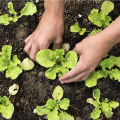Frequently Asked Questions
Is it possible for vegetables, especially squash, watermelons, pumpkins, etc., to cross in the garden to create a strange fruit?
This question comes up every year. Here's the bottom line on vegetable crossing.
Most vegetables do not cross since they would have to be in the same species to cross. But even if they DO cross (those that are in the same species) it will have no effect on the current year's fruit.
Only the seeds will be affected and this will not show up unless you save your own seeds and plant them the next year. In that case, there may be all kinds off types produced.
FYI, watermelons and squash are in different species so it is impossible for them to cross at all.
The crosses that can occur are some squashes with some pumpkins (if they are in the same species, namely Cucurbita pepo) - there are several other species of squash and pumpkins.
Also, various types of melons (NOT watermelons) can cross. These include cantaloupes, honeydews, canaries, crenshaw, santa claus melons, and persian melons since they are in the same species, Cucumis melo.
Dr. Rick Snyder, Extension Vegetable Specialist
Publications
News
With nearly a decade of horticultural production experience, the new vegetable specialist with the Mississippi State University Extension Service plans to serve growers statewide.
Spring is right around the corner, and you probably are getting an itch to start setting out plants in your landscape and garden. If you’re new to gardening, you’ll need to know what plant hardiness zone you’re in.
RAYMOND, Miss. -- Many of the practices associated with sustainability, such as recycling, can be extended into the garden. Composting is a way to help reduce organic waste that goes to the landfill and helps feed gardens. These organic materials, which include grass clippings, leaves and other yard wastes, account for about 30% of trash that goes to the landfill.
Success Stories
Susie Harmon laughs when she relates her granddaughter’s observation of her favorite pastime.
Paul Cavanaugh became a Master Gardener when he came off the road as a truck driver and his wife encouraged him to find a hobby.
Mississippi fresh chef
4-H’er’s recipe appears in national cookbook
When Sydnee Thompson found out the National 4-H Council was putting together a cookbook, she decided to submit one of her family’s favorite recipes.






